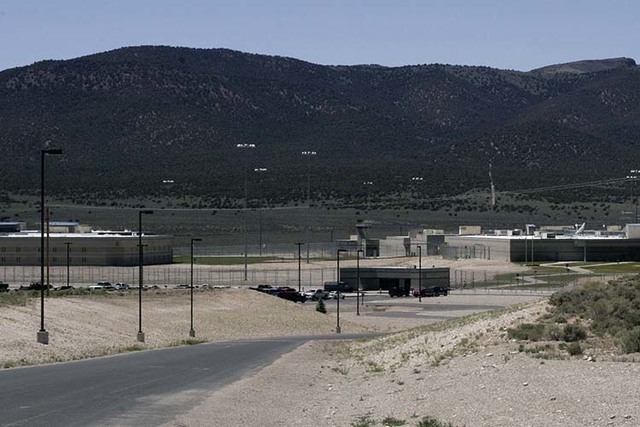Botched executions may complicate Nevada’s death penalty process
CARSON CITY — Messy executions in Arizona and Ohio that made national headlines could buoy efforts by death penalty opponents to stave off capital punishment for some 80 Nevada inmates awaiting execution.
The cases could be used to pile on to the ever-growing number of legal challenges to capital punishment in the Silver State, adding the argument that the use of lethal injection should be considered a cruel and unusual form of punishment, said Clark County Deputy Public Defender Scott Coffee.
“If anything, we are going back to the Dark Ages,” Coffee said. “The guillotine is less cruel and unusual than what they have done in Arizona and Ohio as of late.”
With Nevada already facing a plethora of legal challenges, it remains unclear whether the state has the ability to put someone to death if a warrant for execution is issued.
Nevada’s execution chamber is at Nevada State Prison in Carson City, which was decommissioned in 2012. And it is unknown whether the state has up-to-date pharmaceuticals to perform a lethal injection execution.
Assistant Federal Public Defender Michael Pescetta said he’s not sure how the state could conduct an execution if a warrant was issued. “Because Nevada has not had an execution since 2006, as far as we know, they don’t have any available drugs,” he said.
Pescetta has sought that information through a public records act request but has received no response from the state. He said the public records request was filed some time ago, and his office plans to file another one within the next month.
“If an execution warrant was issued now, I really have no idea what they would do,” he said.
During the 2013 legislative session, Nevada Department of Corrections Director Greg Cox told the Legislature that the execution chamber at Nevada State Prison does not comply with the Americans with Disabilities Act, and the agency would likely face a legal challenge if an attempt to use it was made.
However, the agency recently told the Review-Journal that the execution chamber is being maintained in the event that a warrant for execution is issued.
In the controversial Arizona execution on Wednesday and Ohio execution in January, both men took an unusually long time to die, gasping for air after they were injected with the drugs. Arizona and Ohio used the same drugs to carry out the executions, a combination of a sedative and a painkiller.
“What has happened in Arizona and in Ohio, if it showed us anything, it’s the need for transparency in the meds we are using to kill people,” said Coffee, who represents defendants in capital murder cases. “What has happened is that people are so zealous to get the death penalty imposed that they have decided to cut off transparency.”
He added that the pharmaceuticals that Nevada has on hand to perform an execution are likely outdated and “we would have to go to the same sorts of sources that Arizona went to.”
Meanwhile, there are no executions of death row inmates on the horizon in Nevada.
The state has executed 12 inmates since the death penalty was reauthorized in 1977. Eleven of those executed had voluntarily given up their right to an appeal.
Death penalty proponents have complained that the lengthy appeals process involving state and federal courts have slowed Nevada’s ability to execute an inmate. The appeal process, in some cases, has carried on for decades. One example is Pat Mckenna, who was originally sentenced to death in 1980 but remains on death row at the Ely State Prison in eastern Nevada more than 30 years later.
And now that lengthy appeal process, pushed by death row inmates and their lawyers, might also be used to halt executions.
A recent decision by a federal judge found that California’s death penalty is unconstitutional because of lengthy and unpredictable delays in the state’s court system. The decision by U.S. District Judge Cormac J. Carney noted the delays resulted in an arbitrary and unfair capital punishment system. The ruling is likely to be appealed.
Death penalty opponents such as Coffee and Pescetta also point to the heavy financial cost as a reason to ban the practice.
A 2012 study by Terance Miethe with UNLV’s criminal justice department found that defending the average capital murder case in Clark County cost $229,800 for a public defender and $287,250 for an appointed private counsel.
Noncapital murder cases cost $60,100 for a public defender and $75,125 for an appointed private lawyer, the study found.
And the county could save more than $15 million if the death penalty was removed as a possible punishment in murder cases, according to the study.
The study also concluded that death sentences are infrequently imposed in Clark County capital cases. In nearly half of the cases in which prosecutors sought the death penalty, the defendants were sentenced to life without parole. Capital punishment was ordered in 14 percent of the cases reviewed by Miethe.
But capital punishment remains the law in Nevada and should be sought in “the worst of the worst cases,” said Clark County District Attorney Steve Wolfson.
Wolfson said he is required to follow the law and to seek the death penalty when it is appropriate.
He noted that his office seeks the death penalty in fewer cases than his predecessor, David Roger, who averaged filing a death penalty notice about 20 times annually in the five years prior to Wolfson taking office.
Contact Capital Bureau reporter Whip Villarreal at wvillarreal@reviewjournal.com or 775-687-3901. Follow @WhipVillarreal on Twitter.




























